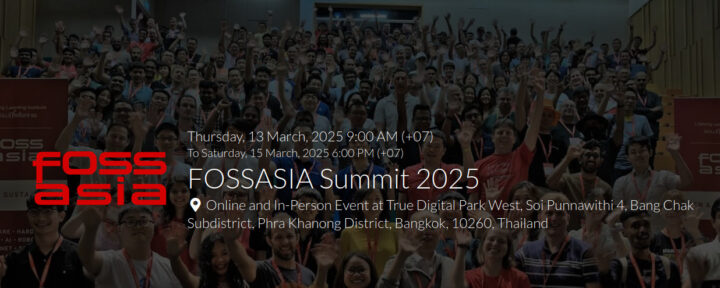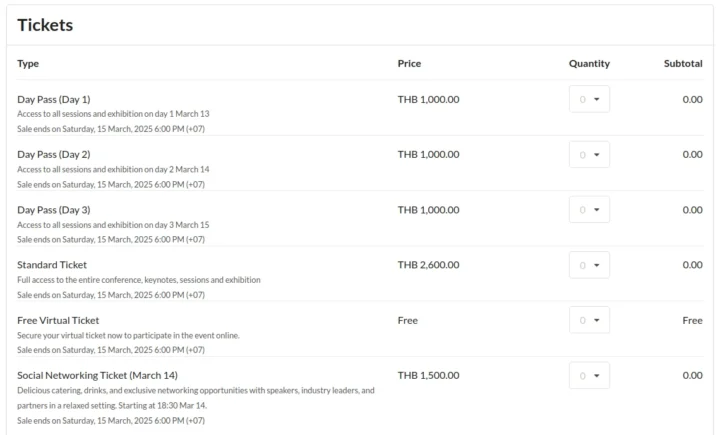The FOSSASIA Summit is the closest we have to FOSDEM in Asia. It’s a free and open-source event taking place each year in Asia, and FOSSASIA 2025 will take place in Bangkok, Thailand on March 13-15 this year. It won’t have quite as many speakers and sessions as in FOSDEM 2025 (968 speakers, 930 events), but the 3-day event will still have over 170 speakers and more than 200 sessions.
Most of the sessions are for high-level software with topics like AI and data science, databases, cloud, and web3, but I also noticed a few sessions related to “Hardware and firmware” and “Operating System” which are closer to what we cover here at CNX Software. So I’ll make a virtual schedule based on those two tracks to check out any potentially interesting talks. None of those sessions take place on March 13, so we’ll only have a schedule for March 14-15.
FOSSASIA 2025 – Friday, March 14
- 9:00 – 9:25 – Licensing Open Hardware by Andrew Katz, CEO, Orcro
The rise of RISC-V marks the coming of age for open hardware. Andrew’s experience in drafting the CERN Open Hardware Licence, the Solderpad License, and others gives him unique insight into the development of this exciting field. Drawing on this experience, he will explore challenges and opportunities arising from open hardware licensing.
- 9:30 – 9:55 – The SecureBoot Saga: Securing the Mythical Boot Process by Christian Walter, Managing Director Firmware, 9elements
This talk gives you an overview of different elements that can help you secure the boot process. The idea is to the listeners building blocks on how they can secure the boot process – and discuss the drawbacks of one of those.
This talk will go through proprietary solutions like Intel BootGuard, or AMD Platform Secure Boot – and show possible open-source alternatives. It will also showcase how the remaining boot process can be secured. We will talk about the concept of Secure Boot – and its flaws in open-source right now.
The listener will get a good overview of all secure boot technologies out there in the wild, and how to combine them to securely boot devices.
- 10:00 – 10:25 – Challenges of unit testing hardware drivers by Alexander Bessman, Maintainer, PSLab/FOSSASIA
Why do we test software? What is a good test, and how does one write a good test for hardware-adjacent software?
- 10:45 – 11:00 – Smart Doorbell with Visual Impairment Assistance by Guruswamy Revana, Associate Professor, BVRIT HYDERABAD College of Engineering for Women
The Smart Doorbell for Visually Impaired Individuals is a groundbreaking innovation aimed at addressing the unique challenges faced by visually impaired individuals living alone. This intelligent system is meticulously designed to enhance both the independence and safety of users by leveraging advanced technologies such as image recognition and audio feedback. At its core, the system consists of a high-resolution camera seamlessly integrated with a microcomputer to identify visitors at the doorstep effectively.
When the doorbell is pressed, the camera is activated to capture a real-time image of the visitor. This image is then processed and compared against a preloaded database of familiar individuals stored within the microcomputer. If a match is identified, the system audibly announces the visitor’s name through an indoor speaker, enabling the resident to recognize and verify the visitor effortlessly. On the other hand, if no match is found, the system announces the presence of a “stranger,” alerting the visually impaired person to exercise caution. This vital feature ensures the individual can make informed decisions about opening the door, significantly enhancing their personal security.
- 11:05 – 11:20 – Raspberry Pi new products update and use cases with the latest products – Pico 2/Pi5/Pi 500/CM5 by Masafumi Ohta, Founder and Representative, Japanese Raspberry Pi Users Group
Since their IPO at the London Stock Exchange, Raspberry Pi has introduced a diverse range of new products and dynamically changed their strategies. These new strategies, which will concern Enterprise/DIY Hobby business and restrategize education business, are sure to pique your interest and curiosity.
In this session, Masafumi will talk about the latest digests of Raspberry Pi products/Software/Hardware updates and their practical use cases with the latest products – Pico2/Pi 5/Pi 500/CM5 (e.g. LLM/Basic OS/E-ink Display system/etc.). These use cases are designed to inspire and motivate you in your projects.
- 11:25 – 12:15 – BrailleRap: re-making an opensource braille printer for meaningful engagement (Workshop) by Saad Chinoy, co-founder, salvageGarden Assistive Makerspace
How we replicated an open-source hardware project to engage communities, address sustainability challenges, and make things that make sense.
Introducing the device, what it’s for, why open-source matters, and how it was replicated in Bhutan, Germany, Philippines, and Cameroon. In this workshop, you’re invited to try the device out for yourself, print something in braille, and ask questions about accessibility, assistive devices, and open hardware.
We will also form a simulated team to understand at what level each of us can participate in replicating an open-source project, with an invitation to find and form one such team at FOSSASIA who might build BrailleRap Thailand!
- 13:30 – 13:50 – The Herculean Task of OS Maintenance – The Debian Way by Ananthu C V, Debian Developer, Debian
Using an Operating System is familiar territory to everyone. But how about building an OS? That gets much harder. But is the hardest part of building it? How about the continued maintenance of the OS? That’s where it gets tricky, really. Especially when you have an OS that is used by who knows exactly how many computers across the world. And yet, Debian, for all its users and requirements, does it well. How?
- 13:55 – 14:10 – Ubuntu Touch: freedom of choices in mobile OS space by Ratchanan Srirattanamet, Maintainer, UBports
Currently, the mobile operating system is occupied by the Apple-Google duopoly, with iOS and Android (respectively) occupying over 99% of the worldwide mobile OS market share. However, it doesn’t have to be that way.
This talk will talk about Ubuntu Touch, an alternative operating system for smartphones. It’s not yet another Android fork; rather, Ubuntu Touch is based on Ubuntu Linux and strives to give a truly different choice to freedom- and privacy-conscious users.
This talk will give you an overview of what Ubuntu Touch is, its history, and how it’s built, as well as the landscape of Linux-based mobile operating systems in general.
- 14:00 – 14:55 – Debian packaging workshop by Andreas Tille, Debian Project Leader, Debian
This workshop is designed for newcomers interested in learning how to package Free Software for Debian. Participants are encouraged to bring a laptop and a link to a Free Software project of their very own interest that they would like to see packaged.
During the session, one example from the audience will be selected as a practical case study, focusing on software that can reasonably be addressed within 1 hour (+x if we get a longer time slot). The process will be demonstrated step by step, highlighting common challenges in packaging and strategies for resolving them.
The workshop emphasizes practical problem-solving and collaboration with the Debian community. It aims to equip attendees with foundational skills and insights into the packaging process while fostering an understanding of Debian’s collaborative workflows.
- 15:00 – 15:55 – Clonezilla Hands-On: 60 Minutes of Cloning Action (workshop) by Steven Shiau, Clonezilla project leader, Clonezilla.org
This workshop is designed to give participants a rapid immersion into practical Clonezilla usage. Over the course of an hour, we will cover the essentials of disk cloning and imaging through direct, hands-on demonstrations. Attendees will learn basic cloning tasks, explore network-based cloning with Clonezilla Server Edition, and perform backup and recovery operations. The session will conclude with quick tips on optimizing Clonezilla for performance and ensuring data integrity. Ideal for IT professionals, students, and tech enthusiasts, this workshop ensures you leave with the skills to effectively use Clonezilla in real-world scenarios.
This session will be a demo, hands-on workshop where attendees will learn how to use Clonezilla, and the details will be provided online so that attendees can try that after this session.
FOSSASIA 2025 – Saturday 15, 2025
- 15:25 – 15:30 – How I made an AI-powered pocket device by Sruthy M L, Software Engineer, Keyvalue software systems
In this session, I will be talking about the AI-powered pocket device I built using a Teensy microcontroller, ESP32, and a digital camera module. Designed as an interactive learning tool, the device uses object detection technology to help users, especially children, explore and learn about biodiversity. It captures images, processes them with a pre-trained MobileNet V2 model, and displays information about detected objects in real-time.
I’ll discuss the problems this device aims to solve—fostering curiosity and awareness of biodiversity in an engaging, tech-enabled way—and share some key challenges I faced during development. These include hardware integration, camera calibration, and optimizing machine learning inference on embedded systems. I’ll also explain how I overcame these challenges with systematic testing, cloud integrations, and embedded AI techniques.
While all three days are packed with talks, it only makes sense to attend on Friday 14 if you are going to follow sessions related to topics covered on CNX Software, since there’s only one 5-minute lighting talk on Saturday. Contrary to FOSDEM where it’s free to attend, there’s a fee to attend FOSSASIA 2025 on-site either 1000 Baht (About $30 US) per day or 2600 Baht (Around $77 US) for the three-day event. It will take place at True Digital Park West, 111 Sukhumvit Rd, Bang Chak, Phra Khanong, Bangkok 10260, but it’s also possible to attend for free online. Check out the tickets page for details.

Jean-Luc started CNX Software in 2010 as a part-time endeavor, before quitting his job as a software engineering manager, and starting to write daily news, and reviews full time later in 2011.
Support CNX Software! Donate via cryptocurrencies, become a Patron on Patreon, or purchase goods on Amazon or Aliexpress






